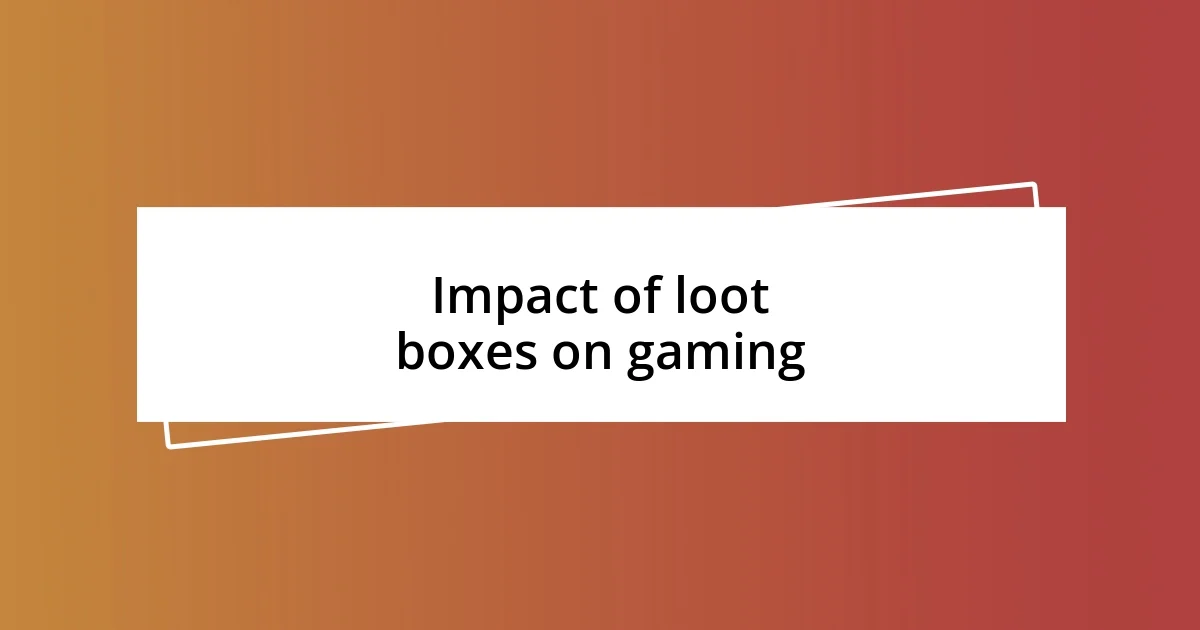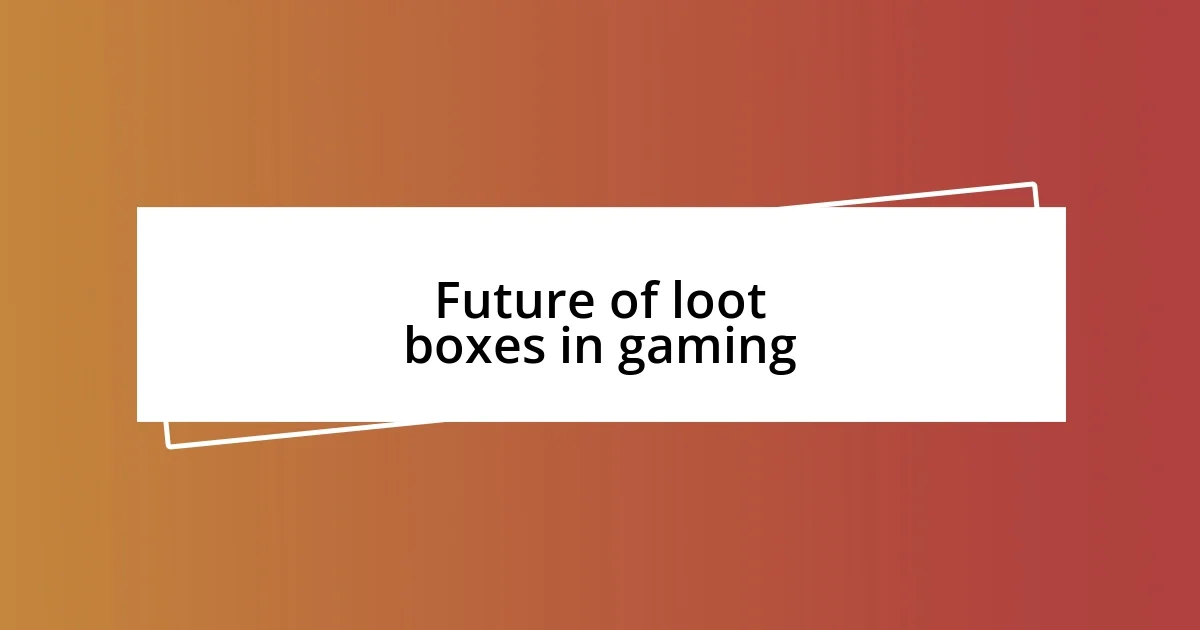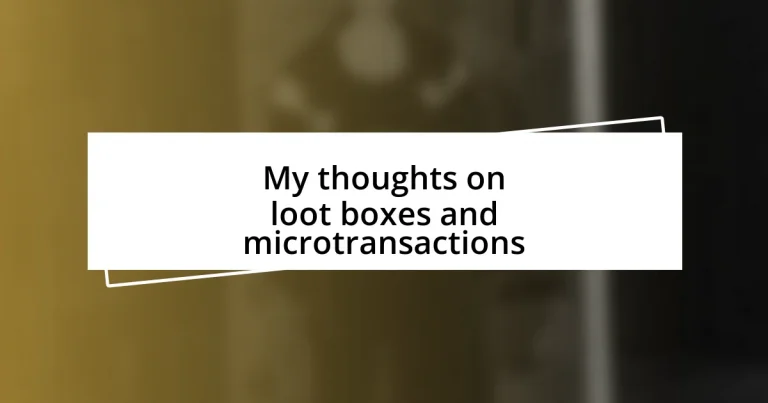Key takeaways:
- Loot boxes can enhance gaming experiences with excitement and surprise but may lead to compulsive behavior similar to gambling, provoking ethical concerns.
- Microtransactions create a divide in player opinions, balancing convenience and customization against potential unfairness and player frustration.
- The future of loot boxes may emphasize transparency, ethical monetization, and innovative systems that prioritize skill over chance, reshaping player engagement.

Understanding loot boxes concept
Loot boxes are essentially virtual containers that players can purchase in video games, filled with random items or rewards. I remember the thrill I felt when I first encountered a loot box in a game I loved, eagerly anticipating what treasure might lie inside. It was exciting, but that excitement turned to uncertainty—what if I didn’t get anything useful?
The randomness inherent in loot boxes can lead to a compelling blend of hope and frustration. Sometimes, I’d find myself tempted to spend just a bit more, thinking, “What if the next one holds the rare item I’ve been chasing?” This question can easily spiral into a cycle of spending, blurring the line between fun and obsession. It makes you wonder: at what point does excitement turn into a compulsion?
Critics argue that loot boxes resemble gambling because of their unpredictability, which resonates with me. I’ve seen friends get hooked on this rush, where opening a loot box feels more like a game of chance than part of a gaming experience. It’s valuable to consider—how can developers balance this excitement without crossing ethical boundaries?

Impact of loot boxes on gaming
The impact of loot boxes on gaming is profound and multifaceted. From my perspective, they can enhance the gaming experience by providing players with an element of surprise and excitement. However, there’s a darker side that I can’t ignore. I’ve witnessed friends feel an emotional rollercoaster, from the exhilaration of unboxing a sought-after skin to the disappointment of landing something completely useless. This cycle can be addictive, potentially leading to excessive spending and a strained relationship with gaming.
Here are a few key points reflecting this impact:
- Psychological Effects: For many players, the thrill of uncertainty can lead to compulsive behavior, mirroring gambling addiction.
- Game Economy Disruption: Loot boxes can skew the in-game economy, making certain items overly available while others become virtually unattainable.
- Player Experience: While some appreciate the randomness, others may feel frustrated, especially if they perceive that success in the game is locked behind paywalls.
- Community Division: These microtransactions can polarize the gaming community, with some advocating for their convenience while others argue for a more traditional, skill-based progression system.
The conversations I’ve had with fellow gamers reveal that while many enjoy the rush, there’s also a significant number who feel betrayed when a game leans too heavily on monetization instead of skillful play. It’s a delicate balance that developers must navigate carefully.

Analyzing microtransactions in games
Analyzing microtransactions in games reveals a considerable divide in player opinions. I often find myself wrestling with the dichotomy of enjoying a game versus feeling pressured to spend. In some instances, I’ve truly enjoyed the convenience of acquiring specific items through microtransactions, only to later question if my enjoyment came at the cost of fairness in gameplay. It’s a tricky balance, and I can’t help but feel that many developers should tread lightly here.
When I contemplate the psychological impact of microtransactions, I realize how thoroughly it reshapes player behavior. For instance, I’ve caught myself considering purchasing in-game currency first thing after logging in, fueled by the desire to obtain certain gear quickly. This urgency often overshadows the simple joy of earning rewards through gameplay, leading me to wonder: what happens to the sense of achievement? I believe it’s essential for game developers to carefully consider how these features can affect long-term enjoyment versus short-term financial gain.
Let’s break down some pros and cons in a straightforward comparison:
| Pros | Cons |
|---|---|
| Enhances revenue for developers | Can lead to player frustration |
| Offers options for player customization | Potentially influences gameplay balance unfairly |
| Encourages ongoing player engagement | Might promote compulsive spending habits |
Ultimately, as I analyze the role of microtransactions in gaming, I can’t shake the feeling that they should enhance, not overshadow, the core experience.

Players perspectives on microtransactions
When I delve into players’ perspectives on microtransactions, I can’t help but think of a good friend who became completely immersed in that world. He loved the idea of customizing his character and collecting rare items so much that he started spending money almost instinctively. Yet, it made me wonder: Where’s the line between enjoyment and dependence? The thrill of the chase was exhilarating for him, but it also created a lingering worry about constantly chasing that next “hit.”
Some players, like me, may feel a mix of excitement and annoyance. Sure, microtransactions can provide an instant gratification fix, but they often lead to a nagging feeling that real skill doesn’t always equate to success. I remember a game where I was stuck against players adorned with exclusive gear, and I couldn’t shake the frustration of feeling sidelined for not wanting to spend extra. It’s a peculiar sensation—like being locked out of a thrilling race because I refused to pay an entry fee while others sped ahead.
Interestingly, while many of us embrace the fun of unique skins and enhancements, there’s an underlying worry about fairness that we can’t ignore. I can recall watching streams where players openly vented about how pay-to-win mechanics skewed the gameplay. It left me questioning: Are these features truly enhancing our gaming experience, or are they reconstructing an increasingly uneven playing field? It seems players are caught in a cycle of wanting both fun and fairness.

Legal implications of loot boxes
When I consider the legal implications of loot boxes, I’m struck by how this issue unravels across different jurisdictions. Some countries classify loot boxes as gambling, which can lead to significant legal consequences for game developers. I remember reading about a country that mandated game publishers to disclose the odds of obtaining items from loot boxes. It made me reflect on how transparency could really change the player’s experience—after all, knowing the odds might prevent some from feeling cheated when they open that virtual treasure chest.
Moreover, the debate over loot boxes often touches on consumer protection laws. I can’t help but think about the young players who engage with these systems and whether they can truly make informed choices. One instance that resonates with me involved discussions around age restrictions for games that feature loot boxes. If minors are spending money without full comprehension, should developers be held responsible for ensuring that their games are safe? It’s a nuanced conversation, and one that could reshape the industry’s approach toward these monetization strategies.
Lastly, the increasing scrutiny from regulators worldwide forces developers to rethink their monetization strategies. I find it fascinating how companies are reacting—some are redesigning their systems to avoid legal pitfalls, while others are doubling down on their existing models. This tug-of-war reflects a broader concern in the gaming community about ethical standards. Are we witnessing just the tip of the iceberg regarding potential legal frameworks to regulate loot boxes? Only time will tell how this evolution unfolds and impacts our beloved gaming experiences.

Strategies to manage spending
To effectively manage spending on loot boxes and microtransactions, I’ve found that setting strict budgets really helps. I usually allocate a specific amount each month for gaming expenses and stick to it. This way, I still get to enjoy some of those enticing purchases, but I also keep my finances in check. Have you ever experienced that moment of hesitation before hitting “buy”? That’s the power of having a budget—it puts the brakes on impulsive spending.
Another strategy I advocate is taking advantage of in-game events and sales. I’ve noticed that many games offer limited-time events that provide rewards without requiring purchases. Participating in these events not only spices up the gameplay but also tempers the desire to spend money needlessly. I distinctly remember a seasonal event in a game I loved; instead of hopping into the loot box frenzy, I focused on completing challenges and earned some fantastic rewards without spending a dime. It’s a rewarding experience that can truly enhance your appreciation for the game.
I can’t stress enough the value of community insights and reviews. Before diving into a new microtransaction, I often check forums or social media to see what others are saying. When my friends share their experiences about what’s worth spending on, it helps me make more informed decisions. Have you ever regretted a spontaneous purchase? I know I have. Understanding the impact of our spending through community feedback can guide us to better choices, ensuring we enjoy our favorite games without breaking the bank.

Future of loot boxes in gaming
As I think about the future of loot boxes in gaming, I can’t help but feel a mix of excitement and concern. One of the most pressing trends seems to be the push for greater transparency—developers might soon have to disclose odds and item rarities, much like those laws seen in several countries. This change could transform how players approach loot boxes; I imagine a scenario where I can weigh my decisions better when I know exactly what I’m getting for my money. Does it make me more willing to engage with loot boxes or less? That’s something I continuously ponder.
Another aspect I envision is a shift towards ethical monetization models. There’s a growing demand from the gaming community for fairness and representative pricing. I remember discussing this with a friend who is a game developer; he shared his hope that the industry could shift towards rewarding players for skill rather than exploiting their desire to collect. What if we moved toward game designs that prioritize gameplay innovations over these monetization tactics? It’s a thought that resonates deeply with me, and I believe it could lead to a more enriching gaming experience.
Lastly, I’m curious about the innovations that might arise in the realm of loot boxes. With technology evolving, I can see gamified systems that allow players to earn in-game rewards through gameplay rather than relying solely on chance. I participated in a game where you could trade earned items rather than just open boxes, and it completely changed how I engaged with the rewards system. Wouldn’t it be fascinating to see loot boxes evolve into a more interactive experience? The future is surely ripe with possibilities, and I can’t wait to see how it shapes the gaming landscape.














